Increasing clean water access in Tanzania through community-managed boreholes
Go back
$19,130
A rural infrastructure project in Tanzania, installing maintainable water pumps built by locals to provide year-round access to clean water.
- Region 🇹🇿 Tanzania
- Sector Clean Water
This project is the brainchild of Benedicto Hosea, a Tanzanian social innovator and founder of Mboni ya Vijana, a youth-led organisation based in Zeze village, Kigoma. Growing up as the son of subsistence farmers, Benedicto witnessed firsthand the challenges of water scarcity and environmental degradation in his community. Motivated by these experiences, he pursued education in land management and sustainability, which inspired him to establish Mboni ya Vijana in 2012 to address these pressing issues. 
Under his leadership, the organisation has implemented a community-managed approach to borehole drilling, utilising simple hand-drilling techniques and rope-operated manual pumps. This method is cost-effective, low-maintenance, and suitable for use in remote areas without access to electricity. To date, Mboni ya Vijana has drilled over 160 boreholes across Tanzania, providing access to clean water for thousands of residents, particularly in rural communities where waterborne diseases are prevalent.  
Benedicto’s vision extends beyond water access; he aims to empower communities through sustainable agriculture, environmental conservation, and youth engagement. His work has garnered international recognition, including speaking engagements at the UK Parliament and receiving the Queen's Points of Light award in 2019. Through Mboni ya Vijana, Benedicto continues to foster self-reliance and resilience in Tanzanian communities, demonstrating the transformative power of grassroots initiatives.
Why this matters
In rural Kigoma, safe water remains out of reach for many. Communities often rely on open ponds or rivers, which are frequently shared with livestock. These sources are prone to contamination, leading to outbreaks of waterborne diseases such as cholera, typhoid, and diarrhoea.
Women and girls typically walk up to three hours each day to fetch water, time that could otherwise be spent in school or earning an income. These journeys can also expose girls to harassment and harm. The lack of water access also affects local clinics and maternal health, with facilities unable to maintain basic hygiene during childbirth.
As population pressures grow, this gap only widens. The need for safe, local, and low-maintenance solutions is urgent.
Why Kwanda is funding more water pumps
Each water pump provides year-round access to clean water for 1,000 to 1,500 people. This reduces the burden on women and girls, improves school attendance, and strengthens public health. It also supports local clinics by enabling safe childbirth and basic sanitation.
Because the boreholes are hand-drilled and fitted with simple rope pumps, they are cost-effective to install and easy to maintain. Community members are trained to service and repair each water point, ensuring long-term functionality. Local labour is used in the drilling process, strengthening skills and ownership.
With each installation, the community gains time, health, and agency.
Technical stuff
The Details
- Working pumps 6
- Residents gaining water access 7,051
Updates
From the field
Borehole drilling starts at New Nyumbigwa School to serve 196 students

Posted 2 Oct 2025
Our sixth water access point is underway at New Nyumbigwa Secondary School in Kigoma, Tanzania, where over 190 students and teachers have struggled with limited access to water. We're bringing hope and happiness to this school community by drilling a borehole and installing a pump for clean water.
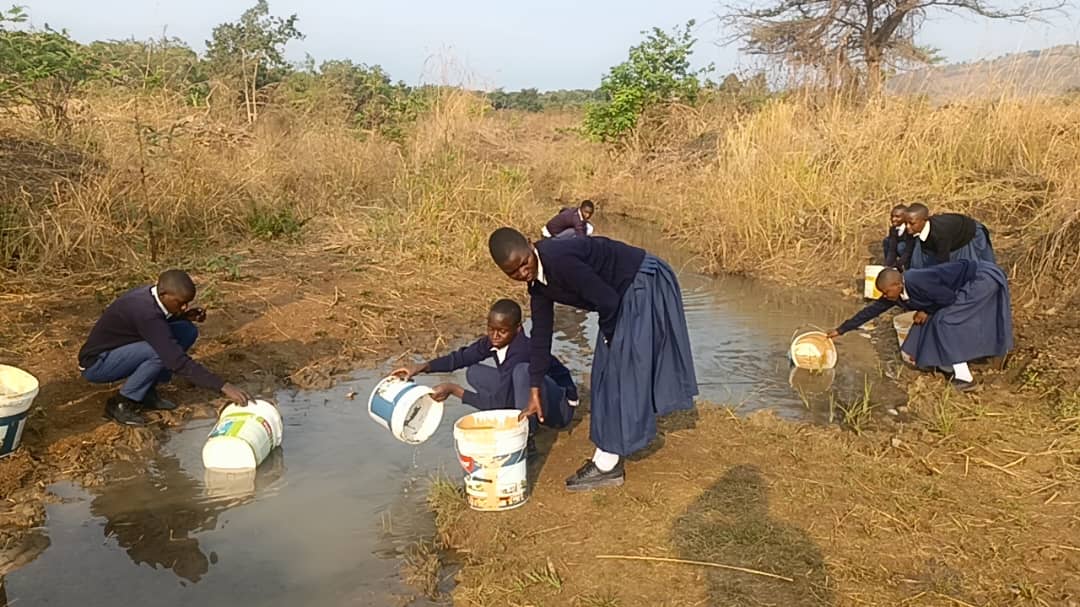
This site is the last of six agreed-upon locations, adding to the five others that were completed before September 22. Once operational, it will serve an additional 196 people—bringing the total number of students with improved water access to 4,536.
Activity:
Conducted a one-day site visit and borehole survey.
Delivered drilling equipment and mobilized the team.
Drilling began on September 22, 2025; drilling has reached a depth of 32 meters, with the water table located at 13 meters.
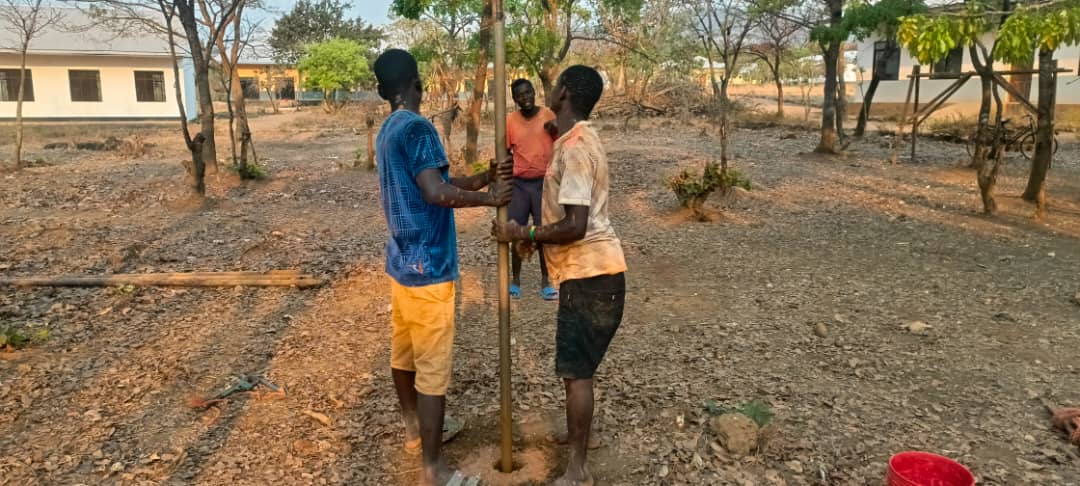
Our school is new and has a serious water challenge. We walk long distances to collect water, which comes from muddy and dirty sources. We have a food program, flowers to water, and need to clean our classrooms and toilets. Without water, flowers dry out, the school remains unclean, and disease spreads, making life uncomfortable and learning difficult. This borehole will change everything. Access to clean water will improve our school life and help us perform better academically.
Financials:
Category | Amount (GBP) |
Received | 1,500 |
Spent | 800 |
Balance | 700 |
How funds were spent:
Expense | Amount (GBP) |
Transport | 130 |
Labour | 600 |
Other | 70 |
5 boreholes bring clean water to 4,300 students in Kasulu, Tanzania

Posted 22 Sept 2025
Access to clean water remains a significant challenge in Kigoma, Tanzania, particularly for rural families where government services are limited. In May 2025, Mboni ya Vijana and Kwanda partnered to bring water to six schools in Kasulu by drilling shallow wells equipped with rope hand pumps. The goal is to provide clean water to at least 6,000 pupils and teachers while reducing the distance (2–4 km) and time (1–4 hours) spent fetching water, lowering the risk of waterborne diseases, and improving school hygiene and academic performance.
To date, Mboni ya Vijana has completed five boreholes, now serving over 4,300 people—including pupils, teachers, and nearby families—at Nyaruhande A, Mwenda, Tumaini, Kasyenene, and Jua Kita Primary Schools in Kasulu.
This report highlights the completion of the fifth borehole at Jua Kita Primary School, finalized in the last two weeks of September 2025.
Developments:
By the end of August 2025, four boreholes had been completed, serving 3,700 pupils and school staff.
With the addition of the fifth borehole, 640 more people now have access to clean water, bringing the total number of beneficiaries to 4,340.

Surveyed and drilled a borehole at Jua Kita Primary School.
Procured and delivered construction materials.
Installed water pumping equipment.
Trained teachers and pupils on usage and basic maintenance.
Officially handed over the borehole on Friday, 12th September 2025.
Beneficiaries:
Subira, Community Development Officer for Health and Nutrition in Kasulu Rural, spoke at the handover ceremony:
On behalf of the school and the District, I am sincerely grateful for this important achievement. The government is working hard to improve education environments, but water access remains a major challenge. Pupils often walk long distances to collect unsafe water, which cuts into study time. This borehole will support our food and nutrition programs, benefiting over 700 students annually as enrollment grows. We thank Mboni ya Vijana and Kwanda and ask for continued support to transform education in Kigoma.
Community member Sauli also shared:
This water source will help not only the pupils but also us in the neighbouring community. We used to walk 2 km to collect dirty water from Hwazi stream. This well will save time and improve our health and productivity.
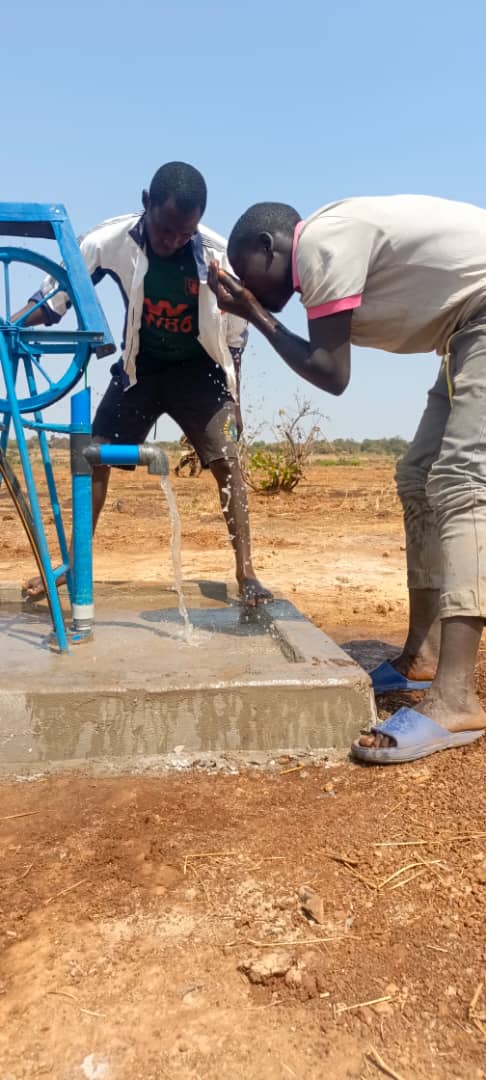
Income | |
Balance brought forward: | £26 |
Amount received: | £1,700 |
Total available: | £1,726 |
Expenditures | |
Labour: | £853 |
Materials: | £233 |
Transport & communication: | £190 |
Skilled labour & training: | £135 |
Drilling Bit Set replacing: | £300 |
Total: | £1,711 |
Funds remaining: | £15 |
Borehole completed at Kasyenene Primary, reaching 3,700 with clean water

Posted 4 Sept 2025
Kasyenene Primary School in Kasulu has long struggled with limited access to clean water, which has significantly affected student attendance, as pupils have to spend time fetching water from distant, unsafe sources. Thanks to financial support from Kwanda, Mboni ya Vijana has successfully addressed this challenge.
Over the past three weeks, the team conducted a feasibility study, engaged with the school and community, drilled a 36-meter borehole, and installed a rope hand pump. On August 22, 2025, the borehole was officially handed over to the school, bringing an end to its water crisis.
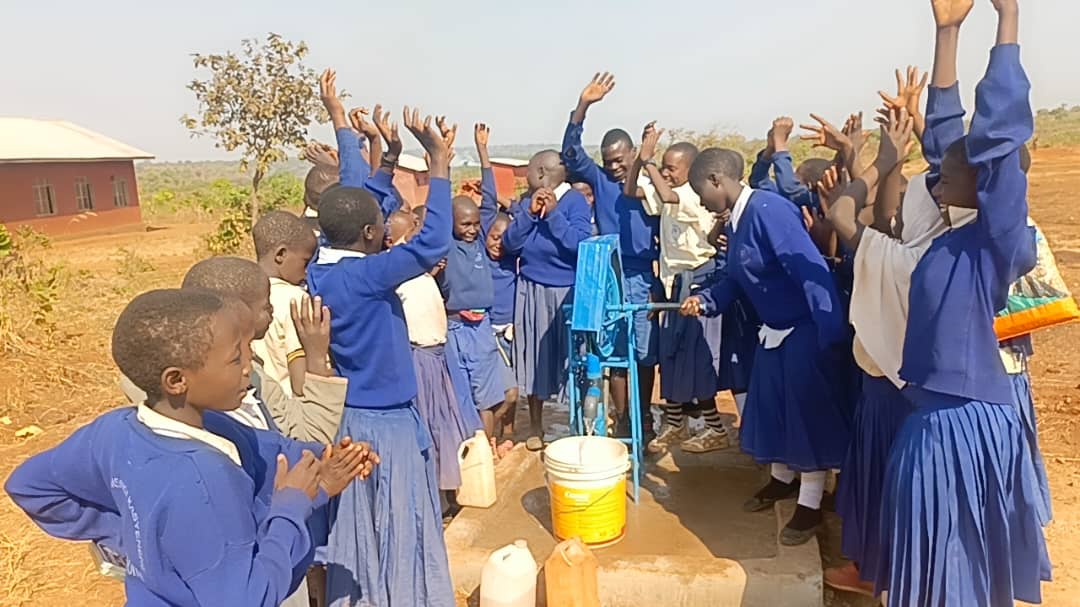
Days 1–2: Conducted water table survey; introduced the project to teachers and community leaders.
Days 3–15: Delivered drilling equipment; drilled 36 meters; procured and transported materials; constructed the pump and base.
Final days: Trained pupils and teachers in pump use, maintenance, and basic repairs; officially handed over the borehole.
Outcomes:
The completion of this fourth borehole has increased the number of schools with access to clean water from three to four. Over 3,700 pupils and school staff who previously had no access to water at their schools now benefit from this project, improving both hygiene and academic performance.
Ferenatus, a Standard Five student, shared:
We no longer walk long distances for water. Now we have clean and safe water right here at school. This borehole will help us focus more in class and do better in our final exams.
Relatsa, a Standard Seven pupil, added:
The time we used to spend fetching water is now spent learning. This is history for us. We thank Kwanda and Mboni ya Vijana for giving us this facility.
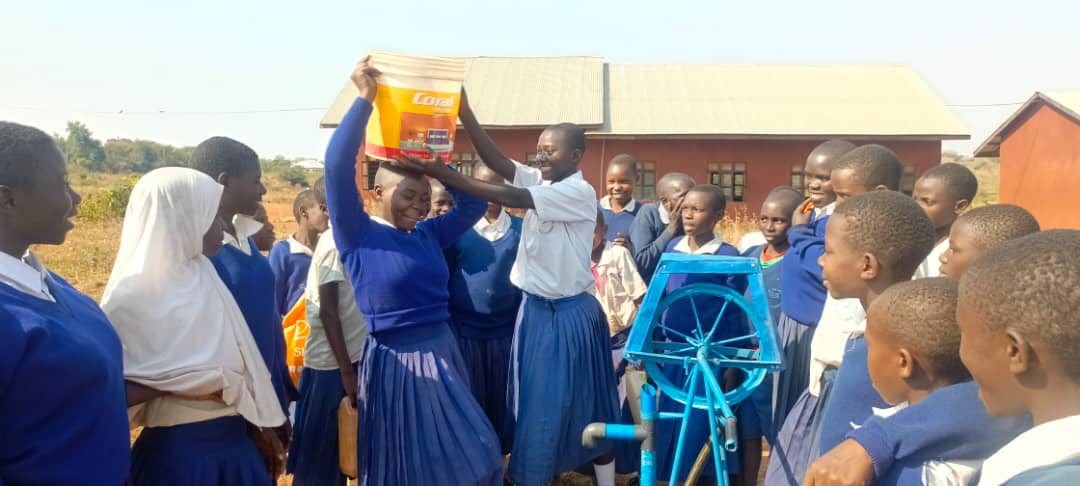
During drilling, we encountered hard rock formations that damaged some equipment. Communication delays also hindered timely updates. We request Kwanda’s support to replace the damaged drilling bits, which will improve future work.
Financials:
Project Overview
Project Detail | Value |
Project goal | Drill and construct 6 boreholes |
Total budget | £10,000 |
Amount spent so far | £6,500 (4 boreholes completed) |
Remaining boreholes | 2 |
Required to complete | £2,800 |
Projected surplus after completion | £700 |
August 2025 (4th borehole) expenditure:
Expenditure Category | Amount (£) |
Drilling labour | 960 |
PVC casing and materials | 180 |
Skilled labour | 90 |
Transport and communication | 194 |
Training materials | 40 |
Total spent | 1,474 |
Amount received from Kwanda | 1,500 |
Balance remaining | 26 |
Two new boreholes bring safe water to Tumaini and Mwenda schools

Posted 13 Jul 2025
We successfully drilled and constructed two new boreholes at Mwenda and Tumaini primary schools in Kasulu, Tanzania. Each site now has a reliable supply of clean water, which will benefit a total of 2,319 pupils and 32 school staff members annually, starting from July 12, 2025. This achievement has brought immense joy to children who previously had to walk long distances to collect unsafe water.
Challenges
At Tumaini School, the presence of underground flowing mud significantly complicated the drilling process, extending the time needed to complete the borehole. At Mwenda, financial constraints temporarily halted construction. We were only able to complete it by securing additional funds from another source.

Another ongoing challenge is the high number of users compared to the water outlet capacity. For example, Tumaini School has 1,209 pupils, but the outlet delivers only 20 litres per minute, equating to 1,200 litres per hour.
Despite these hurdles, the completion of both boreholes is already making a meaningful impact on the health and education of students at Tumaini and Mwenda primary schools. With continued support, we plan to expand our clean water efforts to three more schools in the coming weeks.
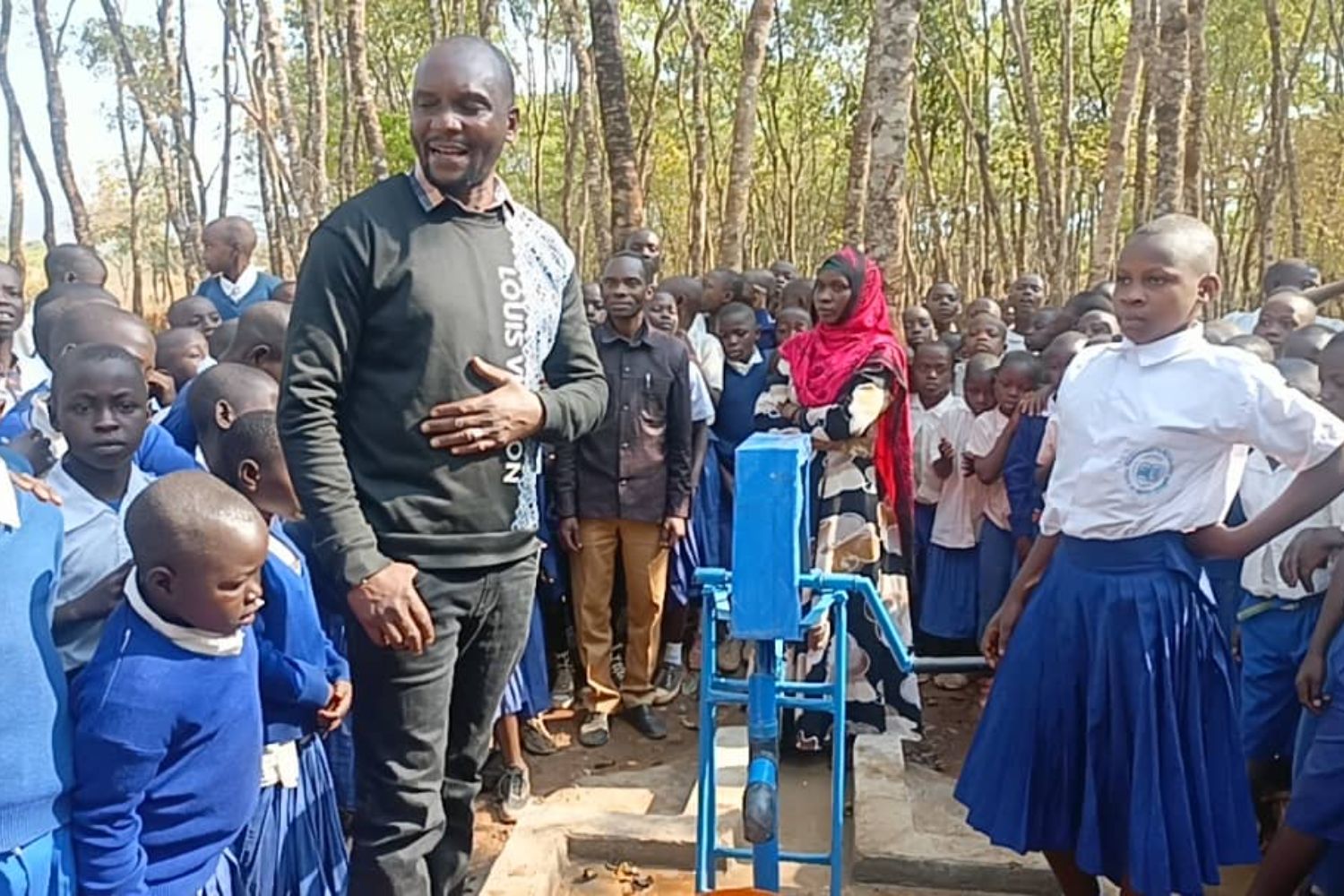
The following activities were carried out:
Conducted site surveys to determine borehole locations
Transported equipment and personnel to each site
Drilled the boreholes
Built and installed pump systems
Constructed borehole infrastructure
Trained school staff and students on maintenance
Officially handed over the completed boreholes to the schools
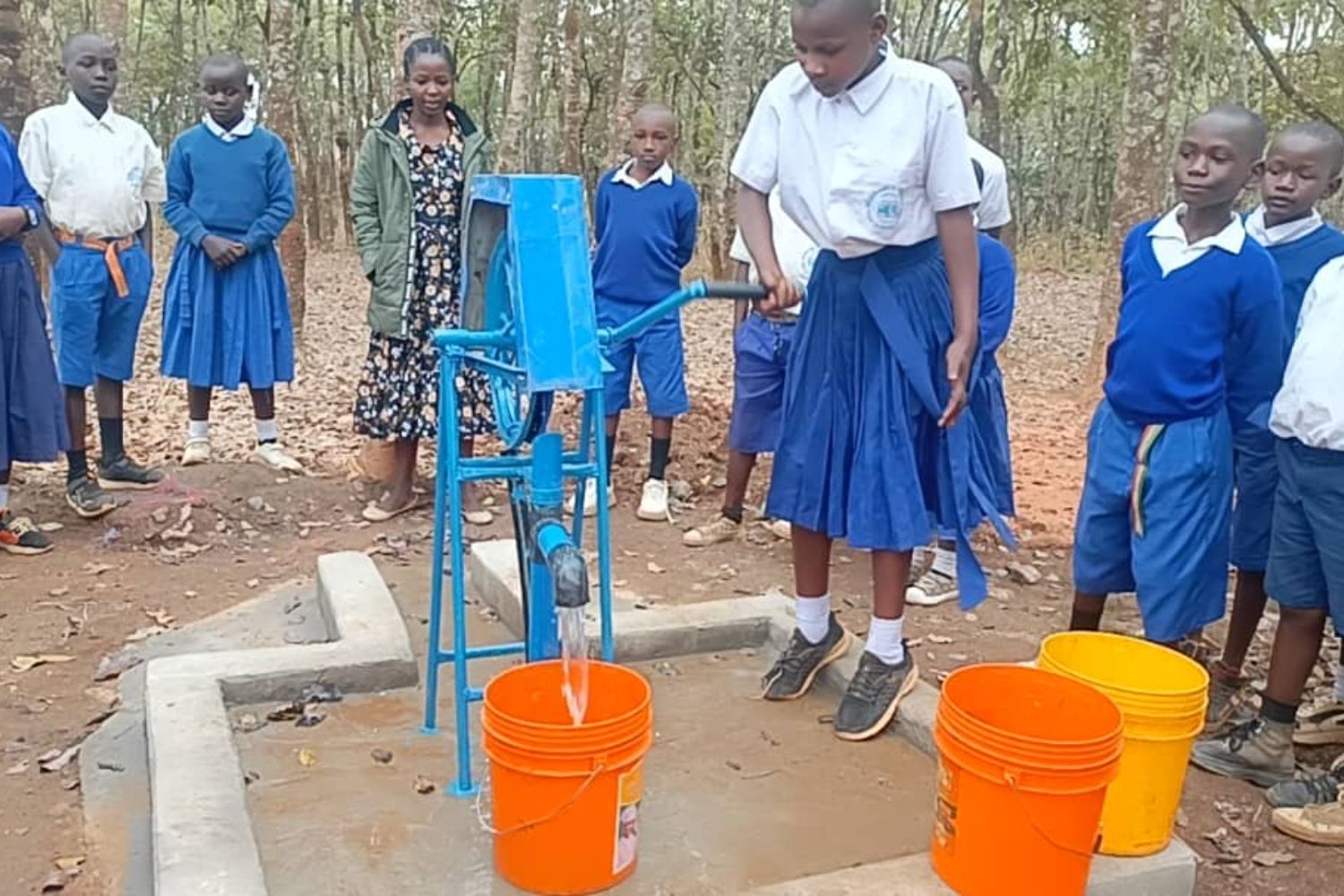
I didn’t like coming to school because there was no water, and we girls were often told to carry water for the teachers. I also hated using the toilet without water. I knew it was unhealthy. Many of us were diagnosed with UTIs and told not to use dirty toilets. Our school is big, and we all share one waterless toilet. Honestly, I was scared to be here. Now we have clean underground water for washing, drinking, and use throughout the school day. I believe this will truly change our school and improve learning for both boys and girls.
Drilling underway for new borehole at Mwenda Primary School

Posted 2 Jul 2025
We are currently drilling and constructing the third borehole at Mwenda Primary School in Kasulu. Drilling began on June 29, and so far we’ve reached a depth of 31 meters.
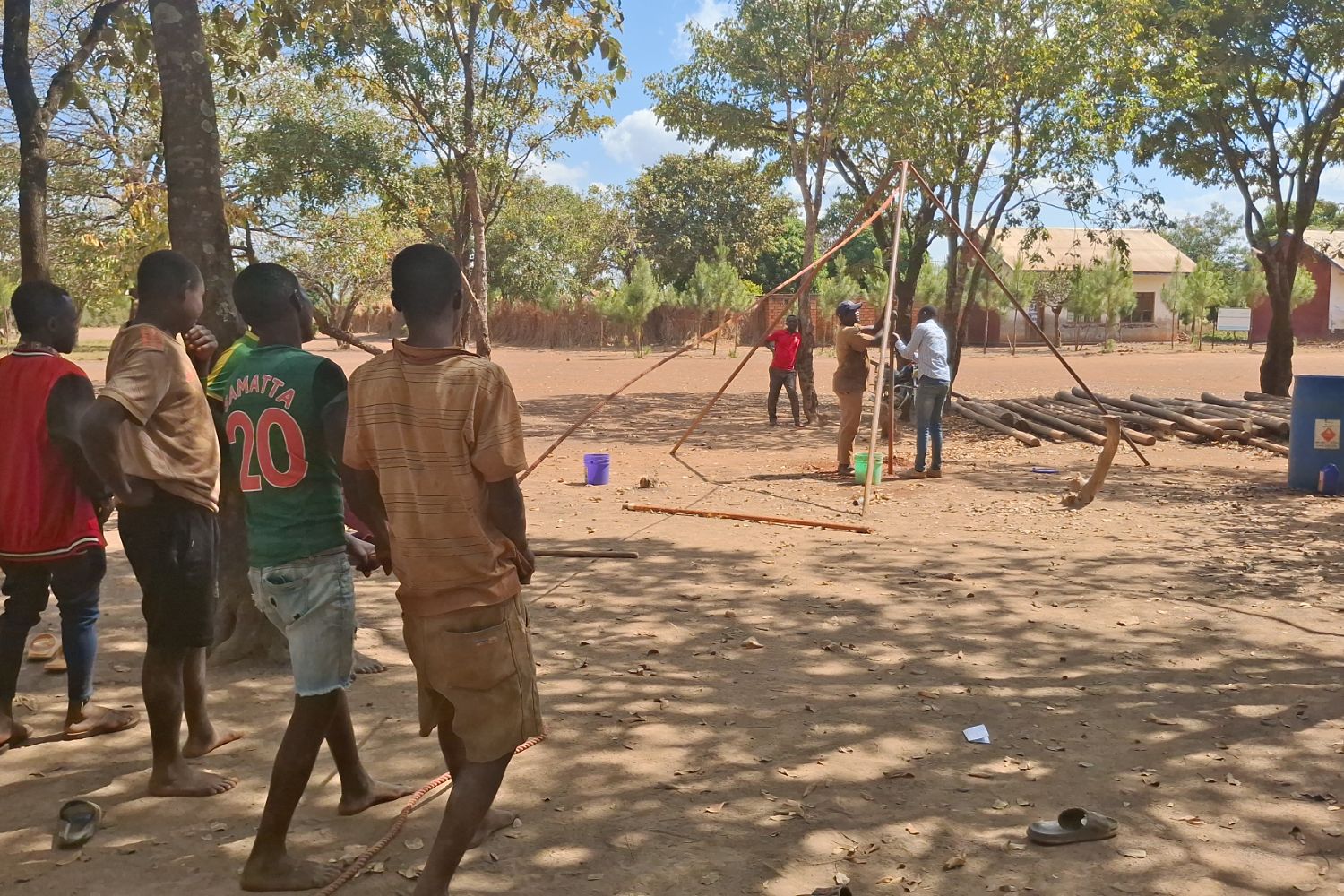
Here’s a video of the 2-3km walk students take daily to fetch clean water.
Once finished, the borehole will provide accessible clean water to 1,120 pupils, 16 school staff members, and 78 nearby households, significantly improving access to safe water in the community.
First school borehole completed in Kigoma, Tanzania

Posted 10 Jun 2025
In the last three weeks, we commenced water boreholes with the goal of drilling and building 7 boreholes in schools in Tanzania.
The survey has done for 3 schools namely Tumaini, Mwenda and Nyaruhande B primary schools in Kigoma Tanzania.
After the survey, one borehole has been completed providing clean water to over 1100 pupils who used to walk 2km to the nearest water source.


Project resumed with new funding to support six drill sites

Posted 25 May 2025
We will resume this project in partnership with Benedicto Hosea, as it was highly impactful. However, due to the soaring equipment costs in the post-pandemic era, we had to pause our efforts.
The good news is that costs are now back down to regular levels, and our villagers have recently earmarked £10,000 to fund up to six new drill sites.
We’ve successfully installed the well and water pump.

Posted 6 Jul 2022

The drilling of the well and installation of the pump is now complete.
There were minor delays due to sand flow in the ground but this has been circumvented and the pump is now in use by the students at Bugaga primary school.
This clean water will:
Eliminate the time students spent walking up to 7km to fetch water. This time will be spent in school.
Irrigate the schools' flower and vegetable gardens and provide nutrition to the school beneficiaries.
Reduce water-borne diseases and absent days of students on their periods.
Drilling has begun at the site.

Posted 3 Jun 2022

Good news! Drilling has commenced at the site, and is now approaching a week of drilling down in to the hard rock.
The water table has been reached at a depth of 14m however the drilling will be concluded at a depth of 29m. The current drilling rate is 3m a day so we should be ready to install the hand pump in under a week - providing access to clean water for the school.
We'll be drilling at Bugaga primary school in Kasulu.

Posted 20 May 2022

Good news! We've identified and surveyed a new drill site at Bugaga primary school in Kasulu, a school in clear need of a clean water source. Here's the report from Benedicto:
The school has more than 1000 pupils coming to school with gallons of water due to a deficit at the school. It makes water access difficult leading to poor hygiene and sanitation for students and the school. Water comes from the stream 3.4km away. Drinking water is an issue, and teachers are not settled on water searching.
Benedicto and his team have surveyed the site, identified a water table at 17m deep and recommend drilling 38m deep.
Drilling starts next Monday, and I'll be sure to keep you updated.
Re-survey has confirmed the hard rock found

Posted 6 May 2022

The re-survey has been completed, and we can confirm the site at Nyarubanda secondary school will not be a productive drill:
There is very little water underground.
The rock resistivity will block the accumulation of new water, and so the current reserve of water may be depleted completely.
How are we fixing this?
The ground team is now looking to re-direct efforts to another location with suitable terrain for drilling.
I'll keep everyone in the loop as things develop!
Hard rock found whilst surveying the Nyarubanda school site

Posted 27 Apr 2022

Some more bad news. During a site survey, the team on the ground discovered impermeable rock, which is blocking water from accumulating in the ground.
As we can't be 100% sure the site is non-drillable, Lake Tanganyika Basin Management Board has been consulted to help re-survey using modern and sophisticated machines to verify what was found.
Delays in drilling at Nyarubanda secondary school

Posted 23 Apr 2022

Due to supply chain issues, we've been encountering some delays in beginning the drilling process.
Fortunately, the supplies were received today. Benedicto (project lead) will be revisiting the school tomorrow for a final inspection of the drill site to ensure it's still a viable site for drilling.
Checking in on the Lalambe well

Posted 6 May 2021
We have received a further update from our recent clean water well project in Lalambe, Tanzania.


The Lalambe well is complete and now in use

Posted 2 Apr 2021

As the well is in a remote area with very poor connectivity, Benedicto has been unable to send images but will do so as soon as possible.
However, Benedicto did manage to speak to the Headteacher of Lalambe Primary School, who said how grateful the school and village are and how much it will impact their progress. He sent the following quote from one of the girls there.
Deborah, a standard 7 pupil at Lalambe Primary School, said:
This pump is fantastic, it saves us so much time. Previously we wasted hours getting water from the stream. Now I can spend more time on my studies and I am more confident I will do well and follow my dreams. Thank you Kwanda and thank you God for this opportunity.


